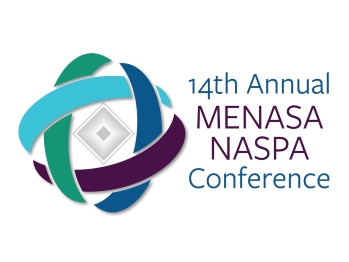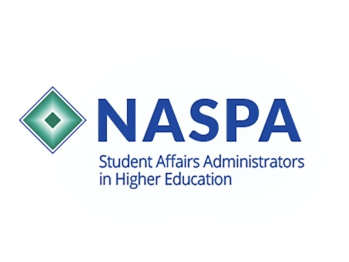
April 12, 2020
Regular Registration
14th Annual (Virtual) MENASA NASPA Conference
Regional Annual Conferences
April 13 - April 15, 2020 Virtual Conference
The MENASA (virtual) conference was an opportunity for educators to engage in professional learning opportunities. The conference was held April 13-15, 2020, 9:00am-11:00am AST. The recordings of the session can be found here.
The 14th Annual MENASA NASPA conference was supposed to be held March 8-10 at the American University of Kuwait, but was canceled as part of precautionary measures that took place across Kuwait related to the coronavirus (COVID-19) continual spread around the world. The in-person event cancellation was in compliance both with Ministry directives and to safeguard the health and well-being of MENASA area professionals.
Presented By

About
Student Affairs and Services in the Posthuman Era: Opportunities and Challenges
In an age where direct human interactions increasingly are replaced and enabled by machines, each of us needs to reconsider our roles both professionally and personally. As student affairs professionals, we need to address the impact of technology on Higher Education and its effects on students--especially when the machine becomes the front-line service provider for students. Increasingly, students utilize technology as the first point of contact for learning, communication and other interactions. Students rely on Siri to answer their questions, on apps to order their food and clothes, and to guide them to their destinations. They connect with their friends and family via social media. Similarly, in Higher Education, online and mobile applications are becoming a common tool for interactions between student and university professionals. The effects of this posthuman era should not be neglected when practitioners in Student Affairs or other areas of higher education look for ways of reaching out to students, engaging them, supporting their life-long learning, instilling values of empathy and civic engagement, and caring for their well-being.
Learning Outcomes
14th Annual MENASA Conference learning outcomes:
- Develop increased awareness and knowledge of regional trends, professional competencies and issues impacting student affairs and services;
- Network with and learn from colleagues across the MENASA Area and beyond;
- Strengthen knowledge and skills related to higher education and professional growth founded in research and best practices;
- Explore future opportunities to collaborate, exchange and further advance Area challenges and best practices.
- Expand one’s understanding of the opportunities and challenges of student affairs and services in a posthuman era.
Conference Schedule
The recordings of the 14th Annual MENASA (virtual) Conference can be found here.
Monday April 13 - Wednesday April 15 - daily 9:00am -11:00am AST
Day 1 - Monday April 13th
9:00am - Opening/Welcome
9.30am - Open Forum Discussion
| Self-Care and Maintaining Community Connections for Student Affairs Professionals |
| Ms. Tayseer El Gaili, Counseling Center Director |
| As student affairs professionals, we often put the needs of others before ourselves, and, in times of crisis, we tend to dive in and go until we begin to burn out. If we are to be effective at what we do, it is important that we take a moment reflect on our own self-care, and in a time of social distancing focus on how we maintain our own community connections.This will be an open forum where we can discuss what we are doing, as professionals, to take care of ourselves during this global health crisis. We will discuss effective strategies that can be useful for you, your students and your families. Come join the conversation. |
10:00am - Concurrent Session I
Option I
| A Simple Framework to Help Students Develop Critical Thinking and Problem Solving Skills |
| Dr. Chris Stryker, Consultant to the Vice President for Academic Affairs |
|
We talk a lot about developing student's critical thinking and problem-solving skills, but these skills are generally presented as developing almost miraculously through determination and perseverance. This often confuses and demotivates students who feel that they are working hard, but not seeing these skills develop for them. This presentation will detail a simple, powerful problem-solving framework that student affairs educators can teach to students that will help them organize their approaches to new and challenging situations and develop personalized, workable approaches to overcome them. These problem-solving skills are short, simple and, above all, generalizable to any academic subject, student club or organization, or life situation. |
Option II
| From Student to Student Affairs: Developing Early Channels into the Profession |
| Mr. Michael Ttappous, Dean's Fellow |
|
This presentation intends to push participants to rethink how they can more actively incorporate students in higher education departments. It focuses on three models: Paid Student-Staff; Unpaid Student-Staff; and Post-graduate Staff. These models promote student engagement and develop channels for students to cultivate a career trajectory within the Student Affairs profession. Examples and illustrative methods across common divisions are showcased to demonstrate how students can be included and activated within these settings. Participants will discuss and share best practices of student involvement and will leave the presentation with new ways to bolster the careers of potential future colleagues. |
Day 2 - Tuesday April 14th
9:00am - Concurrent Session II
Option I
| Counseling vs Coaching within the Career Services Arena in Higher Education (Arabic) |
| Mr. Maged Abdelzaher, Senior Career Counselor |
|
We often hear the terms "Career Counseling" and "Career Coaching" used interchangeably by Career Services' staff and within the arena of Career Development. Are they the same terms? Could a professional confuse the two! Which concept is more suitable for your institution? Which of them is more student-centered? In addition to above, we (as higher education and career services professionals) need to think carefully of the relationship between students and staff. This relationship is fraught from the start: Are students our customers, clients, or collaborative partners? If they are customers, is the customer, always right? If they are clients, what obligations do we have to them? If they are partners, how do we cultivate a relationship of equals that empowers students to close that gap between where they are and where they want to be? This workshop is designed to reveal all the answers of above questions and inquires. |
Option II
| Tale of Two Cities: Global Citizenship and Its Impact |
| Ms. Hiba Zakai, Campus Climate Manager and Co-Curricular Activities Head |
|
In the context of 21st Century Service-Learning pedagogy, Global Citizenship means having dual citizenship; person's national citizenship and the other the global citizenship, a set of personality traits, attitudes and values operating in the relationships with people of other cultures and countries. New regional dynamics are overpoweringly transforming the landscape of higher education. Six of these include: demand, diversification, networking, lifelong learning, ICTs and social responsibility. This session will take a closer look at the challenges and strategies faced in the process of embracing internationalization through global citizenship, civic engagement, and community-based programs as an essential part of curriculum development. |
10:00am - Concurrent Session III
Option I
|
Tell Us Your Story: How to Use Online Forums To Help Students Reflect, Learn, and Lead |
|
Dr. Eman El-Kaleh, Lecturer, Management and Leadership and Courtney Stryker, Advisor to VPSA |
|
Storytelling and self-reflection are effective tools for student learning and student development. This session will discuss how online forums can provide students with a great opportunity to share their own stories, experiences, challenges, and successes. It will facilitate a discussion on how student affairs professionals can use those forums to support and develop their programs. In the current digital yet demanding world, online forums can increase student participation in a number of SA programs without worrying about time limitation and/or availability. Online forums can be used to support different SA programs such as student success, student services, student life, leadership, and counselling. Participants will be encouraged to share their own experiences and thoughts on how online forums can be used to provide students with a holistic learning experience that contributes to their personal and professional development. |
Option II
|
What to Expect from First Year Students (Arabic) |
| Ms. Zadjia Zahi, Section Head of Writing and Language Support, Student Learning and Support Center |
| This engaging session provides participants with an overview of what to expect from first-year students in the GCC. The workshop seeks to address four key questions about this first-year cohort. Namely, who are they; what are they thinking; where are they developmentally; and how can I, as a professional, apply the information from this session in a useful and practical way? |
Day 3 - Wednesday April 15th
9:00am - Concurrent Session IV
Option I
| Student Issues: To Handle Digitally or Face to Face? |
| Ms. Amal Behbehani, Administrative Assistant to the office of Vice President for Student Affairs |
|
In an era where everything is available digitally, and forms are processed online, do students really need to meet in person with the Dean/Academic Advisors/Professors regarding their academics or personal issues?Undergraduate students are typically Gen Z, more used to the touch of an iPad than the flipping of a book. Paperwork is preferred online than going from office to office to get approvals. Would the next step be having student issues handled online instead of in office meetings?To discuss the pros and cons of having in person meetings or on-online approaches when dealing with student's issues. |
Option II
| Supporting Students: How to Respond Virtually |
| Ms. Tayseer El Gaili, Counseling Center Director |
|
During this session, we will discuss how campuses are planning for, and dealing with student issues in a virtual community. Specific topics will include: * How to triage: How do you work with students at risk? Students with special needs? * Steps you can take identify students at risk and how to refer them. * How to work with students in crisis virtually. * How we can utilize our resources using more effectively. |
10:00am - Concurrent Session V
Option I
| Pivot to On-line Advising |
| Ms. Elma Atic, Academic Advising Development Section Head |
| This session provides an overview of different advising structures and advising models adopted and implemented at Qatar University over the past decade. We will highlight how the diverse experience from piloting various models helped in the recent pivot to online advising. There will be time to discuss, share and strategize for how you can help your institution move forward in this new online advising environment. |
Option II
| Writing Center Practice Redefined |
| Ms. Hanouf Al-Juhail, Director of Learning Support Services |
| Online writing platforms are diversifying and redefining writing center practices in unprecedented ways. The Writing Center at the American University of Kuwait launched its online writing platform, AUKZoom, in an attempt to reach out to writers of the digital age and enhance overall efficiency. In this roundtable discussion, participants will experience first-hand the dynamic and multiple functionalities of online conferencing and examine the potential and the impact of software for writing center practices. The table will also discuss strategies for selecting and integrating the appropriate platform to enhance writing center services for the specific needs of the writers in the GCC. |
11:00am - Open MENASA Area Meeting & Closing Remarks